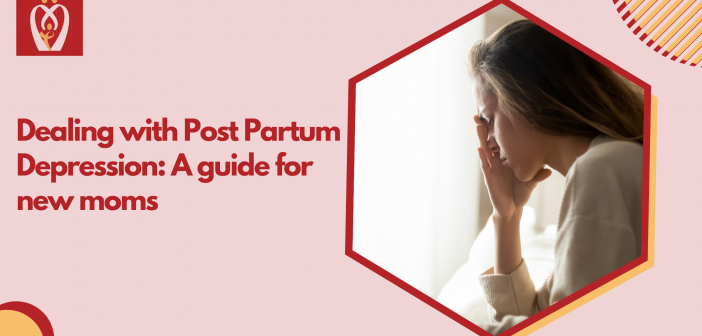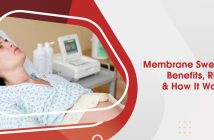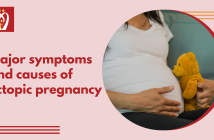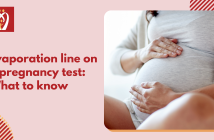After the birth of your child, you may experience a wide range of emotions. Joy, fear, or despair are all possible emotions. Perinatal postpartum depression is characterized by persistent, debilitating melancholy that interferes with day-to-day activities. This blog is all about Dealing with Post Partum Depression: A guide for new moms.
Though they may develop up to six months after birth, symptoms often begin within a few weeks of delivery. Mood fluctuations, difficulties connecting with your kid, and difficulty making choices are all possible side effects of postpartum depression.
You’re not alone if you think you’re depressed. Seeing a GP is the best method to be diagnosed and treated for PPD. They may assess your symptoms and come up with a treatment plan tailored to your specific needs. Some mix of psychotherapy and antidepressants may be beneficial to you.
Establish a strong connection with your infant
When a parent and kid create an emotional link, it is known as a “secure attachment.” Having a strong connection with your kid is critical to their future communication and social development.
In order to have a strong relationship with your kid, it’s important to pay attention to what their needs are and do what you can to meet them. Being a constant source of comfort for your kid helps them learn how to better regulate their own emotions and actions, which in turn helps to improve their cognitive development.
After giving birth, it may be tough to get through each day without suffering from postpartum depression. It also makes it harder to take care of both yourself and the kid. But remember to take baby steps and visit your GP if needed.
Incorporate healthy eating habits into your daily routine
Post partum depression cannot be cured by healthy nutrition alone. Nonetheless, incorporating healthy eating habits into your daily routine may have a positive impact on your health and well-being. The weekend is a great opportunity to plan your week’s meals, as well as to stock up on nutritious snacks. Chopped carrots with cubed cheese, or apple slices and peanut butter, are some examples of convenient whole meals.
Baby massage
As a parent, it’s crucial to provide your kid with a sense of security and comfort via regular physical contact. Post partum depression sufferers may benefit from baby massage, according to various studies.
Build a support network
Humans are social beings, and they desire social connection. Having great social contacts and emotional support may be a protective factor in helping to alleviate stress and cope with life’s hardships.
New moms may experience feelings of isolation and helplessness as they adjust to their new roles. Loneliness has been shown to cause isolation, a lack of connection to others, and a sense of not belonging.
Studies have shown links between loneliness and a host of health problems, including hypertension, sleep disorders, weakened immunity, and an increased risk of heart disease.
In order to better handle life’s challenges on your own, receiving social and emotional support from others helps increase your self-esteem and feeling of independence.
Consume fish oils
You should also increase your consumption of omega-3 fatty acids, such as DHA, during this period. A study showed that women with low DHA levels are more likely to suffer from postpartum depression.
Seafood is a good dietary source of DHA. You may also use flaxseed oil if you’re a vegan. Supplements may also be purchased at your local supermarket.
Try both counselling and medicine
Your GP may recommend medication or psychotherapy if you’ve tried self-help, lifestyle changes, and support groups without success.
Psychotherapy, also known as mental health counselling or talk therapy, may assist you in discussing your worries and emotions, setting attainable objectives, and learning how to deal with stressful circumstances.
As a last resort, antidepressants may be prescribed if you are suffering from severe depression or if previous therapies have failed to help you. If you’re breastfeeding, your GP will take that into consideration when prescribing your prescription.
Observe how you breastfeed
According to a 2012 study, breastfeeding may reduce your chances of getting post partum depression. This protection may last as long as four months after birth, according to some reports. If nursing is something you like, stick at it.
Breastfeeding may lead to depression in some women, but this is a rare occurrence. Dysmorphic Milk Ejection Reflex (D-MER) is the name given to this disorder. D-MER might cause emotions of melancholy, anxiety, or rage that last for many minutes after your milk has stopped flowing in your womb.
Finally, go with the feeding technique that seems most natural to you.
Post partum depression may exacerbate the already challenging post partum period. The sooner you get therapy for your sadness, the sooner you may begin to appreciate motherhood and your new baby.
The Nurturey Pink Book, a digital alternative to the NHS Redbook, has all the tools you will need for your child! Tools like vaccination tracker, measurements, milestones, your baby’s dental health tracker, health reports, receiving trusted NHS guidance and so many more features come in the Pink Book, a must-have for all parents! Learn more at https://nurturey.com/







